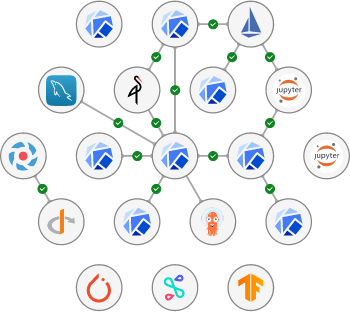Kubeflow AI and MLOps at any scale
Enterprise-ready Charmed Kubeflow, the fully supported MLOps platform for any cloud.
A complete solution for sophisticated data science labs. Upgrades and security updates — all supported in the free, open source distribution.
Accelerate MLOps
- One solution, any cloud
- Multi-user collaboration
- Parallel training at any scale
- TensorFlow, MXNet, PyTorch and more
Cloud ready
- GPU acceleration
- Ready to run on Amazon EKS
- Ready to run on Microsoft Azure AKS
Servers and VMs
- Runs on Kubernetes
- Bare metal deployment
- VM deployment
- NVIDIA GPU autoconfig
No restrictions
- Free to use in any environment
- Open source software
- 24/7 support available
- Expert services to help get you up and running
The complete MLOps lifecycle from concept to production
Professionalise data science with automated AI/ML model training pipelines
Get up and running fast with Charmed Kubeflow on MicroK8s, from lab to large scale. Highly available with 3+ nodes.
Or deploy on Azure, Amazon AWS and Google cloud Kubernetes services with full support available from Canonical — the experts behind Charmed Kubeflow.
Unleash your data scientists with the latest ML tools in a single, browser-based platform. Use the familiar tools they already know — like Jupyterlab, R, TensorFlow, PyTorch and MXNet.
Automatically detect and correct model drift with Kubeflow pipelines.
Katib introduced by AutoML
Charmed Kubeflow includes Katib to simplify model hyperparameter tuning and neural architecture search experiments.
Find the best ML model faster with Charmed Kubeflow and Katib.
Kubeflow support
All–you–need support services
Enterprise support, deployment and fully managed Charmed Kubeflow
Rely on 24/7 full-stack enterprise support with the SLAs you need.
Offload deployment and management to Canonical's engineers.
Automatic GPU acceleration
Easily detect, configure and accelerate deep learning
Accelerate your AI time to market. Pass GPUs to your ML pipelines, for deep learning training and validation.
Train faster on the latest silicon, including NVIDIA® Ampere. Charmed Kubeflow will automagically detect, configure and use available GPUs.
Scale AI experiments to thousands of jobs
Offer data scientists a platform for large-scale continuous AI/ML model training
Founded on Kubernetes, scaling machine learning with Charmed Kubeflow is painless.
Multi-cloud Charmed Kubeflow delivers the elasticity of the public clouds with the governance of on-premise deployment.
Train your team once to work anywhere.
Data lake integration
Big data and event streaming. Turn data into predictions.
Harness the full potential of your data hub by integrating Charmed Kubeflow to deliver advanced, continuous AI inference.
Looking to accelerate your data engineering and MLOps initiatives? Need to integrate with Spark or Kafka? We’ll help you connect the dots.
Open source data operations
Composable, model-driven solutions
Make use of open source integration code and compound the benefit of 300+ available Juju charm operators.
The Juju charm operator solution from Canonical makes deploying and managing Charmed Kubeflow predictable, repeatable and reliable for your IT operations team. Zero friction, from proof-of-concept to production.
Engineered for flexibility around complex scenarios, the Juju charms extended ecosystem allows you to tailor Charmed Kubeflow to your needs with additional integrations — like MLFlow, Apache Spark and Seldon Core.
Optimised for every cloud
Fast AI predictions on every major cloud with GPU acceleration
We work with Amazon AWS, Microsoft Azure, Google and Oracle clouds to simplify multi-cloud, GPU accelerated AI.
Easy setup across cloud Kubernetes services for a multi-cloud MLOps platform. Get the elasticity of the public clouds with the governance of on-premise service management. Separate training from production environments as required — hybrid cloud is also supported.
Automated deployment and management with Canonical's Juju charm model-driven operator solution. Support for major cloud Kubernetes services including Azure AKS, AWS EKS and Google GKE.
Full-stack Charmed Kubeflow
Get your AI initiative up and running fast with integrated, proven solutions.
We work with system vendors like Dell, Lenovo, HP and NVIDIA to bring the best out-of-the-box MLOps experience to the data centre.
Operate a bare-metal Kubernetes cloud on-premise with Metal As A Service.
Canonical's Juju charm model-driven operator solution for Charmed Kubeflow delivers a horizontally scalable, integrated data science system for AI. Includes Canonical Observability Stack, Ceph storage system, Charmed Kubernetes and the Charmed Kubeflow MLOps platform. All with full, 24/7 support available from Canonical.
The MLOps on Kubernetes experts
Charmed Kubeflow is complemented by other Kubernetes solutions available from Canonical, including MicroK8s and Charmed Kubernetes.
MicroK8s is the tiny yet mighty, opinionated zero-ops Kubernetes distribution. Easily build a distributed MLOps environment in record time.
Charmed Kubernetes delivers full flexibility and comprehensive control. Deliver a world-class data science cluster at epic scale.
Need help?
Get in touch with one of our experts now to find out more about Canonical's 24/7 expert services for MLOps environments running Charmed Kubeflow.

